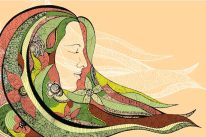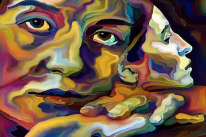
“The boundary to what we can accept is the boundary to our freedom.” ~Tara Brach
I was in the heart of my Ph.D. program when I received the diagnoses: OCD, depression, and binge eating disorder.
It explained a lot, of course. All those years of anxiety, self-doubt, and intrusive thoughts were not normal after all. Eating to the point of gaining forty pounds in a few months was foreign to most people.
I wanted an explanation. Why me?
I had done everything right: I made a decent living, I was kind to everyone, and I was presenting my scientific research at international conferences. Why was I being punished?
I turned to my past and looked for an explanation—something I could pin the blame on. Was it my parents? Had years of moving from place to place as a military child scarred me?
What about my peers? Those uncomfortable years of being teased and bullied for my grades and general good-girl behavior must have led to this.
Perhaps I was to blame? Had I overachieved my way to a mental health breakdown? Had I failed myself?
Those first few months of therapy were the most difficult. I was forced to face all these questions and more, digging into my past and present with both fervor and hesitation. What if I didn’t like the person I found underneath all these layers of expectations?
As I stripped away the beliefs I held about myself, I watched as my worst fears came to life. It appeared that I was to blame after all. I had allowed myself to take on everyone else’s feelings about me and make them my own.
My self-identity was a conglomeration of things I had been told over the years. I was smart, I was capable, I was good, I was bossy, I was sweet, I was stubborn, and I was so many other adjectives.
There was nothing inherently wrong with these descriptors, particularly the positive traits, but I didn’t necessarily relate to all of them.
My family saw me as “a sweet girl,” when I felt more tart than saccharine.
People told me I was book smart, when I knew that I was a good mix of both academic intelligence and common sense.
Some who were uncomfortable with women in power called me bossy, when really I was assertive.
I had brought this breakdown on myself, I thought. How could I have let others define who I would become? Why was I so weak?
It was around this time that one of my therapists introduced me to the idea of radical acceptance.
It’s a concept based in Buddhist philosophy that is used by psychologists to help their clients heal and accept challenges in their lives.
Rather than encouraging us to decide whether something is good or bad, as we often do automatically, radical acceptance encourages us to simply accept that things are.
We have a tendency to apply labels to things. In my story, I had been labeled as smart, an overachiever, a worrywart, and other things. In turn, I labeled my newfound mental health situation as a misfortune, a major obstacle, a life changer, and other (mostly negative) things.
Imagine how much more freeing it would be to live a life apart from labels! The key to this mindset, of course, is to realize that your feelings about an event do not change the event itself.
Let’s say you got into a car accident. You may feel angry, hurt, frustrated, and many other emotions. Those are all valid feelings, and you have a right to experience them.
But your anger won’t undo the accident. The accident happened. The accident is.
Let’s take this one step further, however.
After the accident you become angry that you have become frustrated. How could you allow yourself to get worked up over something that you can no longer control?
You can also attempt to radically accept your feelings.
Your emotional reactions are natural, and it’s counterintuitive to get worked up over what you “should” be feeling. What you are feeling is neither a bad nor a good thing, it simply is.
What situations might you apply radical acceptance to in your daily life?
- You wake up later than you planned to.
- Your cat throws up on your new rug.
- You fail a test that you prepared for extensively.
- Your partner overdrew the checking account.
- You didn’t get the raise you were expecting at work.
Imagine accepting each of these events as something outside your control and training yourself to not get worked up over unexpected circumstances.
This is not an easy task, and it will take time to incorporate the practice into your daily life. Be gentle to yourself.
—
I dropped out of my Ph.D. program after my first year of therapy. My journey into my brain showed me that I was heading down a path that others had set for me, one that I had not bothered to ask myself about.
This major change in my life was labeled by others. To outsiders, I was a quitter, I couldn’t handle the pressure of academia, and I was not living up to my potential.
But for me, this was simply a change. It was neither good nor bad, it was merely different.
Since my mental health breakdown, I’ve experienced a lot of changes, both in my life and in my career. Some of them have been good changes, and some of them have been bad.
But I don’t allow myself to fall into that black-and-white thinking as easily anymore.
I have learned to own my story and my circumstances, and I love myself more because of it.
Change can be good; change can be bad. But, most often, change simply is.
Peaceful woman image via Shutterstock
About Mallie Rydzik
Mallie Rydzik is an online business coach and digital marketing strategist who teaches overeducated and underfulfilled Millennials how to sell their expertise online while maintaining life-work balance. She writes and podcasts about the future of work, self-care, digital marketing, and online business strategy at The Off-Road Millennial.













 Though I run this site, it is not mine. It's ours. It's not about me. It's about us. Your stories and your wisdom are just as meaningful as mine.
Though I run this site, it is not mine. It's ours. It's not about me. It's about us. Your stories and your wisdom are just as meaningful as mine.
This has come at a very good time. Almost odd yet needed. I got diagnosed with tourettes syndrome at a very young age, along with ADD, anxiety etc.. Growing up I never saw myself as smart, only because I had a harder time understanding things than a normal person should, I always had to ask questions over and over again until the person would get frustrated in order to make sure I understood. I also labeled myself as “stupid” because I was and never will be good at math, which is completely irrelevant because Im good at so many other things, but I thought, because I’m not good at that, I’m not good at anything. As I got older I let it define me, and being bullied never helped. I’ve let a lot of what media, society and everyone around me have said, define me. Ive let it all define me to the point where I don’t understand why anyone would love me? I don’t even love myself. I have an amazing boyfriend, amazing family, why can’t I just be? Why am I striving to be so perfect when perfection doesn’t exist? Its because I’ve been living off of the things I’ve been telling myself rather than what everyone around me is telling me. Sometimes its hard to accept what everyone says when ive created this cycle for myself so long ago. Bless you and bless this website, it really helps me through whatever quest I’m on.. But through it all I know what I’m doing to myself, but I just can’t take my own advice, I’m going to do my best and just accept what is. Me! I am me! Xo
I would even call it relentless radical acceptance. No matter how many times things go “badly” and no matter how much things get “worse” and “worse”, having radical self acceptance, having a powerful mindset (not a victim mindset) and being RELENTLESS with those stances is life-transforming. I find the key is to be relentless with it. It’s easy to have acceptance once when you spill pasta in the sink. Then you realize you forgot to buy the so-and-so. Still fairly easy. Then you trip up the stairs. Ok… then you find out your pet has died. Oh no! Life isn’t fair! Why me! Everything’s going wrong today! Then you realize you’ve forgotten to pick a friend up! AAAAAARRRGGHHH! … Life can easily go like that but when we are RELENTLESS with our radical acceptance and ownership (not victimhood), we can deal with it without the ending being one of extreme stress. That sequence of events could easily become self loathing, MY LIFE SUCKS, etc., but with good mindsets and perspective shifts, I think we can respond very differently. (Of course, still very sad the pet has died. 🙁 )
At first, I really and truly thought that this was a blog post I wrote and sent in and forgot about! LOL It is me…you are me…I am you…..we are soul sisters in this soul work! Thanks for sharing!
Hi Mallie
Thank you for sharing your story and insights. That is great you were able to see the path you were heading down was not actually what you wanted, but was carved out based on what others expected from you or what you thought you ‘should’ have wanted. This post resonated with me because this whole idea of judging and labeling is something I have been thinking about lately, and was just discussing with a woman with whom I am doing some energy work. When we get better at releasing labels and judgments and just accepting things as they are, or accepting certain things happened in our past without making judgments about ourselves or whatever, it is so much easier to move past things that are weighing us down energetically.
We keep ourselves open to the channels of receiving, and all sorts of awesome things can come into our experience.
It’s tough to defy who everyone around you thinks you are. My parents pigeonholed me and were very black and white with everything I did. I got tired of being wrong and moved to another state. Sometime you just can’t stay around friends or family if they won’t let you be whoever you want to be.
Social media seems to reinforce the victim mentality Laurence mentions below. If you aren’t raised to be self-confident and walk tall past the idiots, then every negative thing other people say about devastates you, you absorb it, and take it in as true.
Wow this was a fantastic read
For the past few months I have been having similar feelings, that I am not who others think I am. This is largely the case because I let others define who I am simply because it is easier to do so. I have been trying to chip away at this state of mind but I have come to find it is much more difficult than I expected.
Lately I have been pushing myself very hard to figure things out now that I have graduated from college yet when I think about why I am pushing myself to the point of an emotional breakdown I see it is not for my own benefit but for others. I don’t want to be seen as a failure, a bum or someone who has no direction in life. But instead of moving forward for my self I am motivated by these fears which is no way to lead a healthy life I’m coming to find as I get no enjoyment at the accomplishments I do achieve.
Either way it does help that I can relate to someone who has gone through similar experiences.
Thanks for sharing your story, I’m sorry to hear about your diagnoses and how they made you feel. I hope you also begin to embrace that “Me! I am me!” feeling.
Oh I love that, Laurence. Yes, we should be relentless!
Hi Jennifer, thanks for sharing your article as well! I like the idea of self-compassion following acceptance.
Wow, that’s so funny, Kristen! Glad to know there are others like me out there.
Kelli, I love the idea of allowing acceptance to open us up to receiving all kinds of things, both good, bad…and neither.
That’s tough when you’re left to respond to your parents’ desires rather than your own. : And I agree that social media doesn’t really help at times.
Thanks for sharing, I hope you figure out who *you* are and what *you* need to be doing.
really enjoyed this and had heard about radical acceptance before, so this just instilled in me what I need to do.
thanks.
Glad to hear that, Lisa!
Hey Mallie, thanks for sharing! I also found Tara’s book on Radical Acceptance really useful.
Question on the post though: Although acceptance is an immensely useful too, how did it help you not borrow labels from the outside world (what you described in the first part of your post)? Can you please share that? Thanks!
How does religion fit into this argument? Let’s say someone who was taught to be Christian at a young age by parents? Isn’t that taking on others beliefs?
Interested to hear what others have to say about this.
Sorry? What does that have to do with this blog post
Me too this relates
wondering what kind of therapist you had. It reminds me of Avatar which examines beliefs. Our son has been battling OCD, anxiety, depression, etc. despite “having it all” and we have some nutritional leads but if he gets therapy, there are a lot of therapists who aren’t that helpful. Would like to find someone here on Maui who examines beliefs. I’ve gone a bunch of different things and that has been most effective (that and Constructive Living: accept it all and do what needs doing next.). Aloha, Gail
Hi Gail, I had a therapist who specialized in OCD and eating disorders, an OCD therapy group, a regular doctor, a psychiatrist, and a nutritionist on my team. My grad school insurance covered it because they were all university employees, so I lucked out that the school had hired competent mental health professionals. I’m still seeing a therapist with eating disorder expertise and whom I just click with and trust.
Good question. By accepting who I felt I truly was, I was able to shed those labels others had placed on me. I no longer accepted that what someone else said about me was accurate or reflective of me as a person.
Well I didn’t intend for this to apply to religion, however this experience did force me to examine my religious/spiritual beliefs that I had been raised in to see which parts still resonated with me, if any. I think it is important to examine your spirituality in situations like this to make sure you’re not just going with what you’ve been told. If you end up at the same conclusions, that’s fine, I think the reflection is the important part.
Like this, I have found acceptance to be the answer to my emotional challenges. I stopped the “whys” Why me, why this, why that”. I may or may never know the whys, what I can control though is my thoughts and challenge negative thinking when it arises. I found that when I challenged an aspect of myself that I did not like and wanted to change more of that very same thing that I did not want appeared in my life, but I see it today as me learning how to earn authentic power. The more you challenge an unwanted aspect, emotion, behavior, what have you, the Universe is compassionate and brings more of it to light for you to gain power by challenging it. Not easy and at first it made me feel what is going on, but when I finally got the authentic empowerment over the thing it was wonderful. Authentic power is earned the old fashioned way through practice, mindfulness. Of course this is my opinion only.
Hi…your post was very encouraging and gave me a little gleam of hope as I have been battling with ocd and depression myself…I have been facing the same problem of trying to find out why this happened to me.I had to drop out from post graduate course as I couldn’t figure out whether I was doing it coz I like it or under pressure of parents and society .. initially I tried to put blame on others, but this was of No use…then I wanted to find out what mistakes had been by me to land in this place… My therapist tells me to forgive myself and move ahead but I find it very difficult… slowly I have been trying to accept my situation… I am still struggling with it…I try to find out what is it that I like and not base my life on what others think… I was glad to come across your post…made me feel that I was not alone in this… I like your idea of radical acceptance… I will try to implement it…thanks
Thanks for sharing Mallie,
Love reading this post, it reminds me that we have very little to gain by berating ourselves or others for mistakes. Things happen, it’s how we react that counts. I used to work in a high-pressure work team and what stood out most, was how people’s reactions and attitudes made all of the difference in the world. One of my superiors would react to problems or setbacks with the view that “It is what it is” and that gave us a realistic playing field. She didn’t waste time or energy pointing fingers or wishing it had turned out differently. It made for a productive work environment =)
Reiki Hugs,
Regina
I can relate to this. Being self-judgemental is so damaging to your self-esteem as well as taking on the labels that others place upon you (or that you place upon yourself). Unconditional love is for everyone including the self. When I discovered I have a relationship with myself in therapy, I thought it was so strange, but it is true. I enjoyed your article.
Great topic Mallie! We all spend way too much time focused on labeling everything and then believing what the label says, instead of working in unison with the world around us. It creates the depression and anxiety that many of us suffer with and a quick way to turn it around is in your words. Thank you.
Thank you!
It is such a strange realization: how can I have a self relationship? Yet here we are.
What a great attitude from a superior!
Ah, Nidhi, sorry to hear that. Just know you’re not alone, and it’s not a hopeless journey.
Stopping the why’s is so powerful in and of itself. Why? Because.
That’s a very interesting idea, “having a relationship with myself”. I’m going to bring that up in therapy tomorrow. Thank you for sharing!
“Imagine accepting each of these events as something outside your
control and training yourself to not get worked up over unexpected
circumstances.” I would love to be able to do that! Anger has been an issue for me for two years now, which is new to me. I also “lose it” when unexpected circumstances arise; it’s like I have no control over myself, it happens within a moment. I used to be able to accept things and move on, and it made life much easier. I really have to practice this more often. Thank you for this article, and thanks to everyone for your comments. They’ve made me think.
It always amazes me how some readings or conversations happen at seemingly the perfect time. A goal of mine this year (and just about every year, really) is to be more kind to myself. I’ve been talking with my therapist a lot recently about self-compassion, and this article – and your honesty – work very nicely into that conversation. Thank you for posting.
LOVE THIS! It is so amazing how we can get caught in the good/bad; right/wrong thinking and feeling. Thanks for writing a good reminder of just accepting what IS! <3
Idk why pple around the world are always putting up pictures of attractive people! Its getting annoying! This world loves its attractiveness! Why cant you put a pic of a chubby person for example?
This is such a great article Mallie. First off, thank you for your honesty. Your vulnerability and acceptance allows others to do the same. Radical acceptance is such an important and elusive thing. For me, I think I’m accepting a situation but in reality my emotions will tell me otherwise. It’s a constant exercise of expanding my personal awareness. I just wrote a post, “Welcome to My Meltdown” (http://bit.ly/1CwZquX) where I talk about my own experience of working through a difficult situation through acceptance, expanded awareness and self-compassion. Self-compassion is a wonderful next step after we’re in a mindset to accept. I look forward to reading more posts!